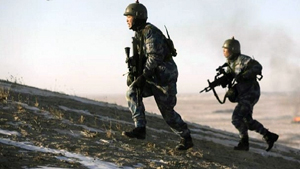Srinagar, March 13: After frequent incursions in Ladakh area, Chinese People's Liberation Army (PLA) troops have been spotted at forward posts along the Line of Control (LoC) on the Pakistani side of Kashmir, ringing alarm bells in the security grid.

The Army has spotted presence of senior PLA officials at the forward posts opposite Nowgam sector in North Kashmir after which some intercepts of Pakistani army officers suggested that the Chinese troops have come to create some infrastructure along the LoC, sources in the know of developments said today.
Army has officially maintained complete silence on the issue but have been constantly updating various intelligence agencies about the presence of PLA troops along the Line of Control, the sources said.
The PLA troops were first spotted in the later part of the last year and ever since their presence was witnessed opposite Tangdhar sector as well. In this area, Chinese government-owned China Gezhouba Group Company Limited has been building a Jhelum-Neelum 970 MW Hydel power project.
The hydel project is being built in response to India's Kishanganga power project being built in Bandipore of North Kashmir. The Indian project is designed to divert water from the Kishanganga River to a power plant in the Jhelum River basin and will have an installed capacity of 330 MW. Construction on the project began in 2007 and is expected to be complete this year.
The intercepts also suggested that Chinese PLA would be digging some tunnels in Leepa Valley, located in Pakistan-occupied Kashmir (PoK), to build an all-weather road which will serve as an alternate route to reach Karakoram Highway.
The visit by PLA officials is seen by experts as part of Beijing's 46 billion dollar China-Pakistan-Economic Corridor (CPEC) under which Gwadar port in Karachi is linked to Chinese Xinjiang province through Karakoram highway, an area under illegal occupation of China.
As the CPEC project was given final shape, India had last year registered its protest against the presence of Chinese troops in Gilgit and Baltistan, an area in PoK, saying that it was unacceptable to India.
In the meantime, some of the experts in the nation's security grid have been giving serious thoughts to the presence of PLA in close proximity with Pakistani army officials. Chinese officials have maintained that CPEC was an economical package to link Asia with Eurasia.
Srikanth Kondapalli, Professor in Chinese Studies at Jawaharlal Nehru University, who has been part of think-tank on Indian policy towards China, feels that the over growing presence of Chinese PLA was a cause of worry for India.
"What we know is that China is going to raise three divisions of its PLA under a local name in PoK that will guard the Chinese interests in occupied Kashmir. One needs to understand the game plan of Beijing," he said.
Reports emerging from PoK were suggesting that PLA under a local name will establish a security wing in the PoK so that India does not protest. The new three divisions, around 30,000 men, will be deployed in and around the installations built by the Chinese firms, the sources said, adding this way Beijing can also justify its presence along the LoC in northern part of Kashmir.







Comments
Indian media will not highlight this issue, because our current government is not able to face stronger countries like china. They can fight against poor countries like Pakistan, Bangladesh or Nepal
Instead of fighting our own indian. the Cheddiwalas should go there and show their patriots to the country by defending from chinese advancement..
Add new comment